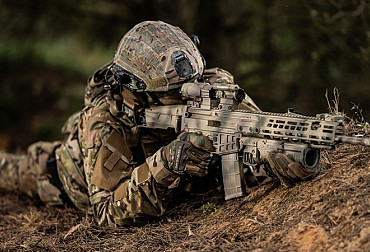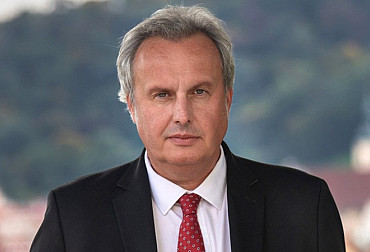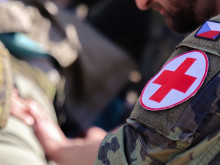Gen. Ivo Střecha: I don't see the way in a robust quantitative increase in the army's capabilities, but in the completion of existing capabilities
Lieutenant General Ivo Střecha served as the First Deputy Chief of the General Staff of the Czech Armed Forces until the end of July this year.Prior to that, he was the Director of the Force Development Section of the Ministry of Defence, where he dealt with, among other things, the modernisation of the Czech Armed Forces and major acquisition projects. In October 2023, General Roof took up his post as Military Representative to NATO and the EU in Brussels. Based on the above, we asked the General for a balance sheet interview.

Mr. General, your posting has changed, you are in Brussels on the NATO Military Committee. Is this a completely new environment for you or are you familiar with it?
Of course, I know the basic tasks of the Military Committee and its role in the structure of the Alliance. I am equally familiar with my duties. At the same time, I would like to remind you that I am not only the military representative in NATO, but I am also a member of the EU Military Committee. I am not a complete novice in the international environment and all the challenges that await me are quite clear to me. On the other hand, it is an important position, which is why I have also prepared for my time in Brussels with respect and humility.
In what ways will your work be a continuation of your predecessor (Lieutenant General Jaromír Alan) and in what ways will it be new, also in the light of the latest Vilnius Summit?
General Alan performed his position in difficult conditions. He handled the crisis related to the COVID pandemic, the Ukrainian crisis and last but not least the tasks related to the Czech EU Presidency very well from my point of view. The implementation of the summit conclusions will undoubtedly be the number one priority, but I must be prepared to tackle any challenges that the future may bring. Given the wider range of crises the world is going through today, there may be more than I would like.
Staying on the NATO summit in Lithuania, what new challenges does our army have ahead of it?
Let's be honest, the conclusions of the summit are no great surprise to us. The MoD and the ACR, together with partners, have long been involved in its preparation in terms of shaping conclusions, measures, tasks and positions. The Heads of State did not meet to open up topics that had not been discussed beforehand, but to agree on what the different levels of civilian and military management of all Alliance members and their bodies have been working on intensively for several months.
We are clear, and I am pleased that the steps that the Czech Republic is taking, and will take, are fully in line with the conclusions of the summit. In addition to the activities already under way, such as support for Ukraine, strengthening the Alliance's eastern wing, and allocating appropriate financial resources for defence, these measures are also part of the conceptual documents currently being drawn up in the form of the Defence Strategy or the Concept for the Construction of the Czech Armed Forces.
At this meeting, a plan to increase the number of soldiers and equipment in order to have a more combat-capable military force to deter the enemy was presented. How can the Czech Armed Forces contribute to this? Do we have anything to offer?
You see, I am a pragmatist and past experience has shown me that ambitious, good-looking concepts and plans that are not based on a realistic assessment of the Czech Republic's capabilities are useless. This is especially true when we are still struggling, and will continue to struggle for a long time, with an internal debt towards the army that has been accumulating for decades. I don't see the way forward in some robust quantitative increase in the capabilities of the military, but in completing the existing capabilities with all that goes with it and what we need to wage war. Last but not least, we need to strengthen the system to sustain these capabilities in the long term, even in times of conflict. Building Potemkin villages, however much it may have a short-term deterrent effect, is a road to hell. We do not live in a safe world.
At the heart of everything is the financial resources that countries commit to invest in defence. How quickly will the enacted 2% of GDP into defence translate into military equipment? What preparation does the Army have to do to make the investment meaningful and prospective?
The enactment of 2 percent defense spending, as well as a range of changes in defense funding, is something the military has long called for. From a planning perspective, it's not about the 2 percent, it's about having a much stronger guarantee in resource allocation over the medium and long term and a greater degree of flexibility in budget spending. This will allow us to plan and implement the development of the army more effectively, which is generally a longer-term task. Believe me, I know what I am talking about. I have been responsible for the development of the bulk of the Army for almost five years. And if I have had to change plans several times every year because, for example, it will not be the promised 2 per cent, but only 1.6 per cent of GDP by 2028 or 2029, the difference over time represents tens of billions. When you factor in the complexity of the acquisition process itself, the result was sometimes quite illogical timing of purchases. Prioritising an already prioritised shopping list several times could not have led to anything else. In any case, I am glad that even in such conditions the errors were minimal, public funds were spent efficiently and the investments made helped the army.
The concept of the construction of the Army 2030 already envisaged two percent in the given period. The current crisis has forced us to make minor changes in terms of the timing of individual purchases, but the substance remains unchanged.
What I am a little concerned about is the Army's ability to prepare and execute acquisitions well at all stages in coordination with other MoD units. Despite some measures taken by the Army in the past period, such as the reorganization of the General Staff, strengthening of the management of development activities, and the construction of several acquisition sites, these measures appear to be insufficient. It is not possible to carry out acquisitions worth 60 billion a year with similar structure, capacity and processes as when the army was spending only 10 billion crowns a year in investments. That we have been able to do this so far is due to the enormous commitment of personnel. With this, I would like to pay tribute to all those movers and shakers of the heart. And it's not just military personnel.
I have similar concerns about the life cycle security of newly acquired weapon systems. The life cycle for the obsolete equipment and weapon systems used to date has not been an issue because of the huge surpluses in the post-CSLA warehouses. If we procured something new, there was a problem, see the difficulty in operating Pandur II combat vehicles or the T-72 tank upgrade. There are many of these planned projects in a relatively short time and modern weaponry like BVP, SHORAD, 155mm gun, new battle tank, new transport aircraft, new supersonic aircraft will require an honest costing of their operation. The MoD and the Army are already setting up this system and we will see how we can solve this potential problem.
How do you see the position of professional soldiers in our society compared to, for example, soldiers in the US or UK armies?
We are talking here about something that is hardly comparable given the history and traditions. In any case, I must say that the position of a soldier in our country today is diametrically opposed to what I experienced at the beginning of my career. It is, of course, a positive development. The professional army and the soldiers have built up a very good reputation over the years through their activities, and regular surveys show that we have a high level of public trust.

Some time ago, the minister said that we have excellent soldiers, but not such a good army. I absolutely agree with that statement. All members of the army deserve my admiration, not only those combatants we see on advertising banners, but also those in support positions, logisticians, signalmen, soldiers, medics, officers and the Silver Corps, generals and corporals, and civilian employees not excluding. I have been tremendously fortunate in the personnel I have had the privilege of working with in all of my capacities.
When we spoke on CZ DIALOGS in April of this year, you said that recruiting is the key to a functioning military. How are you doing in fulfilling the tasks of the CDF?
In general, it's not just about recruitment, but about setting up a comprehensive system that allows us to recruit and also retain personnel in the organisation. The requirements for educated personnel and their subsequent training will increase with new technologies, and this takes time and also appropriate resources. Recruitment is probably a little slower than we have set out to do in the ACR, especially in regions where the military labor market is not as strong. In any case, we still have a few years to reach the numbers we have set.
The Active Reserves (AZ) are an entity of the Army that is becoming increasingly important. Reservists serve, for example, in the Multinational Battle Group in Slovakia. Do you think their role will grow? Do you think it is one of the ways of keeping in touch with professional soldiers who are leaving the service?
I'll be honest here again. Realistically, the AZ system is the only thing that can primarily help the professional army in the initial phase of a potential conflict. Massively mobilizing additional reserves, creating larger units, is not realistic because the army simply does not have that capacity and it would cost a lot of resources to build it up. I am not satisfied with the speed with which we are arming the AZ forces. However, it should be remembered that in parallel we are dealing with the neglect of the professional army and the construction of a new category of soldiers, the AZ Corps. Here I would like to ask our fantastic AZ soldiers for a little more patience.

Russia's war in Ukraine has been going on for over a year and a half, and President Pavel spoke at the Vilnius summit about the time limit for Ukrainian forces to complete their military operation. How much longer can we materially support a fighting Ukraine?
The simple answer. As long as the will of the free world is there to continue. This is not just about the Czech Republic.
The war in Ukraine is changing established practices in European armies. How much of an impact does this conflict have on the Army itself, on changes in the command/control of our military as a whole and its priorities?
If I were to say that the war in Ukraine has totally overturned our plans, I would admit that we are not building an army for war, but to exist, as it were. The fact that we are accelerating something or adding something in terms of using technology or allocating more resources to munitions or sustainability doesn't represent a fundamental change. Our goal has always been a combat-capable army, it's just that the resources were sort of lacking.
How do you perceive the personnel turnover in the command of the Army? Is the arrival of new commanders a support for meeting the new needs and capabilities of the Army?
The current, basically completely new management of the army, the directors of the general staff sections and the commanders of the forces, are very educated and motivated people who understand the reality of today very well. I see it as a certain challenge that such a massive turnover has taken place within a few months and that some of them lack historical experience. They're discovering discoveries, they don't know well enough the reasons why the current state of the military is the way it is, and they don't have hands-on experience with the full range of processes that govern the military. But given the quality of our commanders and directors, I firmly believe that they will quickly overcome this seemingly insignificant handicap and it will not have such a large impact on their future work.
Society has once again begun to talk about almost forgotten terms such as military service or mobilisation. In addition to the possibility of participating in the active reserves, we also have the so-called voluntary predestination. How can the ACR contribute to a positive perception of these steps, which are forced by the instability of the surrounding world?
Forgotten terms are forgotten because we have lived in a favourable security environment for several decades. This does not mean that the need to "mobilise" all available resources of society in the event of a threat to our sovereignty has disappeared. The MoD is taking all available steps to ensure that we are able to do this. As far as the military is concerned, the soldier will never decide whether or not there will be a war. His job is to prepare the army to succeed in a given conflict and also to remind us from time to time that the defence of the Republic is a matter for all of us, not just the army. And that requires the activity of others.
Looking back at your tenure at the General Staff, not only in your current role as 1st Deputy NGS, what have you achieved and what tasks will you hand over to your successor?
What I have managed or failed to do is not a question for me, but for my superiors in each position. I can only say for myself that I gave my best to the work in each position. I was fortunate in many ways in the colleagues I had, the subordinates I worked with, and the fact that more resources began to flow into the Army after all these years. We didn't have to work, as they say, 'in the drawer', but we got concrete results in the form of signed contracts for really high-quality equipment.
I was very pleased that, after many years, we have started to take seriously the preparation of the army for the worst possible crisis scenarios. A cyclical system of preparing it is being created and it is preparing for what armies are primarily designed to do.





















